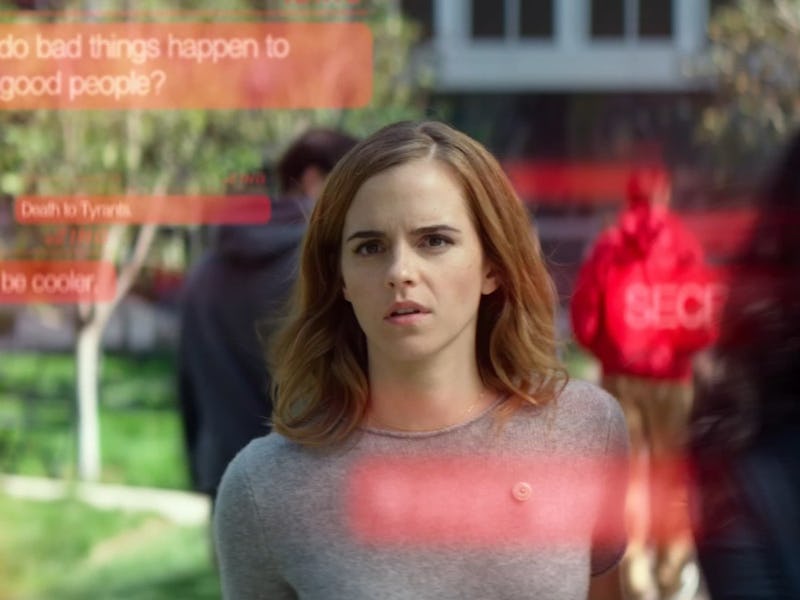The Circle Tried to Warn Us About Facebook. No One Listened.
It’s exhaustingly self-serious, but there are intriguing ideas buried in the melodrama.

Brace yourself for a searing question that penetrates straight to the heart of modern culture: What if social media is sometimes bad for us?
You may be somewhat familiar with this query if you’ve watched Black Mirror, or Mr. Robot, or Silicon Valley, or Ingrid Goes West, or Not Okay, or if you’ve read a single newspaper article this century, or if you’ve been exposed to Twitter radiation for more than 10 seconds, or if you’ve ever suffered the misfortune of meeting an Instagram influencer. We’re as obsessed with questioning the healthiness of social media as we are with continuing to use it anyway.
Regardless, The Circle wanted to fill a niche. Based on Dave Eggers’ novel, it wouldn’t dance around the dangers of social media with sci-fi metaphors, or soften the blow with satire. “Here is a stand-in for Facebook,” it said. “Look at how evil it is, even though it’s run by Tom Hanks.”
Released seven years after The Social Network and a year before the Cambridge Analytica scandal broke, The Circle was an admirable but inept misfire that attempted to warn viewers about the perils and abuses of big tech at a time when those abuses couldn’t quite capture our attention. It has the cast of a prestige drama — Hanks, Emma Watson, John Boyega, Patton Oswalt, Bill Paxton, and Beck for some reason — but the tenor of a Lifetime movie that had stumbled into an unusually large budget.
Watson’s Mae escapes a dead-end call center job to work at the Circle, which is like Facebook merged with Twitch, Google, Apple, and the front company of a lesser Bond villain. Mae starts in customer service, but quickly rises through the ranks as the Circle introduces SeeChange (get it?), tiny cameras mounted on drones, worn by people, and embedded throughout the world to enable perpetual streaming. After SeeChange cameras save Mae from a dramatic kayaking accident, she volunteers to be the first employee to go “completely transparent” by perpetually streaming her entire life.
Mae wins online fans but alienates her friends and family as the Circle pushes for more power. It’s suggested that you should be able to vote with your Circle account, and then it’s suggested that you must vote with it. SeeChange cameras are used to hunt and catch a criminal. A congresswoman agrees to stream her political dealings. CEO Eamon Bailey (Tom Hanks, in his first of two flop adaptations of Eggers novels) insists these innovations will be a triumph for good governance and human rights, but then the high ideals begin to trample the real lives who are forced to embrace them regardless of whether they want to.
Watson quickly rises through the ranks of one of the world’s most annoying workplaces.
There are intriguing ideas here, as The Circle attempts to tackle the random cruelty of digital dogpiles, the gilded cages of Silicon Valley campuses, the corporate eclipsing of state power, and the cheeriness with which technocratic authoritarianism is pitched to us. But the movie is so exhaustingly self-serious that it descends into melodrama. When Mae’s worried friend, the technophobic Mercer, rants, “We used to go on adventures … and now it’s all filtered,” he might as well be staring at the camera. And if you balked at “dramatic kayaking accident,” rest assured it looks as silly as it sounds.
The Circle wanted to be the mature companion to Silicon Valley’s silliness, but both the book and the movie are at their sharpest when they let their hair down a little and skewer the sheer obnoxiousness of the interminable badgering that social media subjects us to. Maybe, to defeat posters, you must embrace their spirit. At the very least, you have to embrace something. While Eggers’ novel can read like a rant about the kids these days, it has a chilling ending that the movie ambiguously walks back.
In retrospect, The Circle gave its ersatz Facebook too much credit by making the megacorp actively malicious instead of bumblingly incompetent. The searing investigations into Facebook’s role in electoral interference didn’t reveal that 1 Hacker Way is full of Machiavellian schemers; it revealed people in over their heads and too stupid to realize it. Facebook never had some master plan to dominate every element of our lives. It just oopsie-doodled its way into enabling genocide. Hanks’ CEO is slick, but watching today you’re forced to imagine him off-screen, spewing money at AI and the Metaverse like a child demanding annoying new toys.
“Hanks and Watson are good, but...” sums up the majority of The Circle’s critical reception.
The Circle, like the Metaverse, did not have legs. A small budget kept expectations low, but when you debut behind How to Be a Latin Lover, something has gone awry. Maybe there’s an irony here in that a movie about the grim triumph of indifference to the dangers of perpetual digital monitoring was rejected by audiences also indifferent to the danger. Or maybe The Circle just wasn’t very good.
Still, at a time when a real supervillain has seized control of Twitter, it remains intriguing. The Circle is blunt when it points out that tech billionaires demand the very privacy that they insist we should surrender, and that Zuckerberg’s infamous “move fast and break things” ethos can break people. But it isn’t wrong. When SeeChange leads Mercer to an ill end, the Circle’s bigwigs construct an alternate explanation for the plain truth that’s been put on display. It’s a reminder that no amount of transparency will keep the powerful from lying to you.